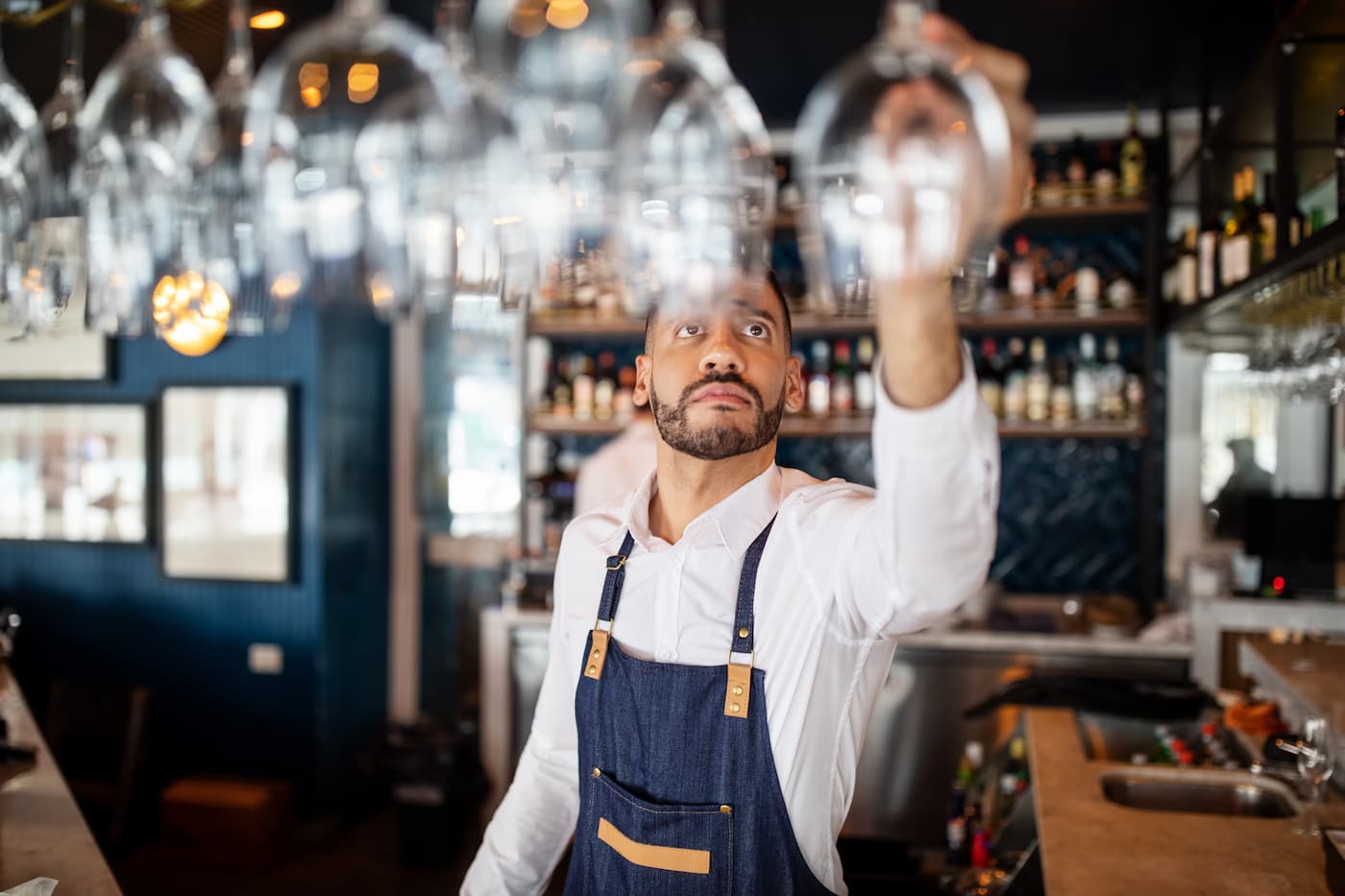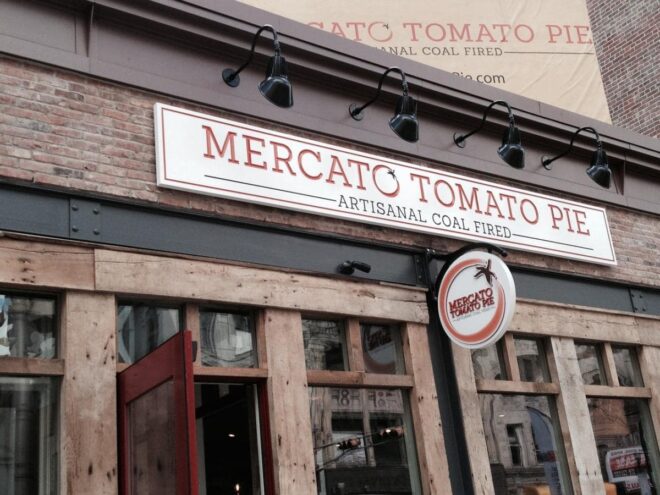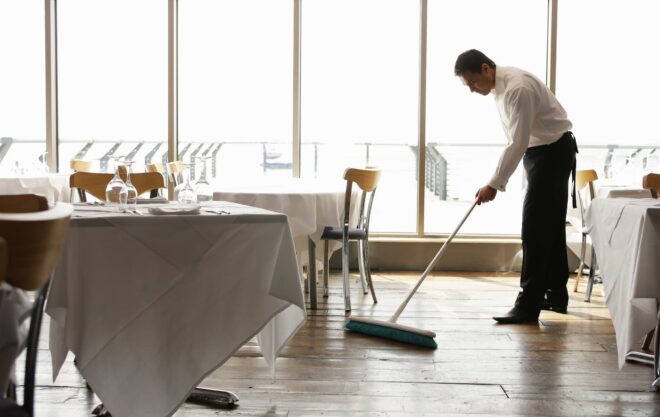How to conduct alcohol server training: A guide for restaurants and bars
Editorial Team
6 min read
So you’ve opened your own restaurant or bar. You’ve secured a location, a liquor license, a point-of-sale system, and a reliable staff. But do your front-of-house employees—such as servers and bartenders—understand how to responsibly serve alcohol to your customers?
Whether you’ve operated a restaurant for a day or a decade, alcohol server training is integral to protecting your community, your workers, and your bottom line. Alcohol-impaired driving caused more than 10,000 preventable deaths in 2020. Most states’ dram shop laws allow injured plaintiffs to sue the bar or restaurant that overserved a drunk driver. In some states, including Minnesota and Washington, furnishing alcohol to a minor can result in criminal charges for your employee and the suspension or loss of your business’s valuable liquor license.
Alcohol safety training empowers your staff to serve boozy beverages responsibly. While impaired customers may try to pressure your staff into serving “just one more,” adequately trained–and supported–workers can feel confident in calmly refusing irresponsible sales and encouraging the customer to return on another day.
What is alcohol server training?
Alcohol server training is a class for bar and restaurant staff who serve alcoholic beverages. It can be held online or in-person, and it’s often as quick as an hour or two. Despite its brevity, this training can be essential for the health of your business. It’s mandatory for beverage servers in 20 states, incentivized in 23 more, and worthwhile in all 50. According to the Minnesota Prevention Resource Center, adequate alcohol serving training should cover:
1. Pertinent laws and ordinances regarding the sale of alcohol
2. Verification of age, forms of identification, and forms of false or misleading age identification
3. The effect of alcohol on humans and the physiology of alcohol intoxication
4. Recognition of the signs of intoxication
5. Strategies for intervention to prevent intoxicated persons from consuming further alcohol
6. The licensee’s policies and guidelines, and the employee’s role in observing these policies
7. Liability of the person serving alcohol
8. Effect of alcohol on pregnant women and their fetuses, and women in vulnerable situations
Most alcohol safety training focuses on two major areas of responsible beverage service: (1) age restrictions and (2) intoxication awareness.
Age restrictions on alcohol service
In the United States, the legal drinking age is 21, as established in the 1984 National Minimum Drinking Age Act. However, many states permit exceptions based upon circumstances. In Texas, minors may legally consume alcohol in a licensed establishment, such as a bar or restaurant, if their parent or legal guardian is present and consents. Many states allow minors to consume alcohol given to them by a parent at the parent’s house. No federal law may ban underage drinking on Native American reservations, as they belong to sovereign nations who may set their own laws.
Alcoholic beverage training will teach your staff how to request and perform identification checks appropriately for your state and area. Your restaurant may also set a higher threshold than 21 for ID checks. Many businesses even ask employees to check the ID of anyone who appears 35 or younger.
Note that kombucha and other fermented beverages often contain a very small percentage of alcohol by volume (ABV). U.S. federal law defines “alcoholic beverages” as those that contain at least 0.05% ABV, so most commercial brewers ensure their kombucha’s ABV falls below that level. Kombucha with an ABV below 0.05% may be considered appropriate to sell to minors.
It’s not just the customers’ age that matters when it comes to serving alcohol; legally, any employee who serves alcohol at your business must be at least 18 years old.
When and how to stop serving alcohol
On top of averting illegal service to a minor, alcohol server training can prevent overservice, which the state of Washington defines as “any person apparently under the influence of alcohol [purchasing] or [consuming] alcohol” at a restaurant or bar. Your employees will learn to recognize possible signs of visible intoxication, including loud and/or slurred speech, clumsiness, sullen or inappropriate behavior, and bloodshot, glassy eyes. They will also learn strategies for cutting off intoxicated customers, such as gently and discreetly telling them, “I don’t feel comfortable serving you another drink tonight, but I’d love to see you again soon.”
Where to find qualified alcohol trainers
Many businesses exist solely to provide alcohol server training and safety certifications. TIPS, Serving Alcohol Inc., and Learn2Serve are among them. When arranging training, it’s especially helpful to locate a business or consultant with offices in your area–they’ll be much more familiar with your state’s laws and regulations. Be sure to ask other local restaurant operators what training provider they’ve hired–or search the Better Business Bureau’s website for accredited businesses. Your state’s government may have vetted particular providers, too.
Renew your team’s knowledge and diligence
Alcohol training isn’t a one-and-done occurrence. It’s best to recertify employees about once a year. Some states require alcohol safety certification within certain timelines (for instance, 30 days from their hire date or once per calendar year).
Supporting your staff beyond alcohol server training
Impaired customers may try to manipulate uneven power dynamics–either flattering young servers or threatening to report workers to a manager for their refusal to serve another drink. Make sure your staff knows they can trust you or your managers to take their side in all reasonable situations. Even better, encourage them to ask you to step in and handle difficult customer service interactions for them. Consistently advocating for your staff will earn you trust and respect, translating to better retention rates and employee satisfaction.
Also, be clear about alcohol certification requirements and best practices in your employee handbook. Outlining your expectations creates accountability between you and your team. It’s a good idea to offer guidance on alcohol-related customer service, and consider linking to alcohol safety classes and websites where employees can learn more.
Responsible beverage service makes your restaurant more comfortable for all
Your customers will likely enjoy spending more time at your restaurant if your team serves alcohol responsibly. To learn how you can attract more business, check out Clover Rewards and these great event ideas. To facilitate even better service, take advantage of Clover’s helpful apps, like Table Pay and Happy Hour.
If you’re interested in learning how Clover’s bar POS system can help your establishment grow, contact a Clover Business Consultant today.
CONTACT SALESThis information is provided for informational purposes only and should not be construed as legal, financial, or tax advice. Readers should contact their attorneys, financial advisors, or tax professionals to obtain advice with respect to any particular matter.
Related Posts
QSRs, it pays to get creative with food promotions. Here’s how one Clover merchant did it.
Full Service Restaurants (FSR)
How to reduce restaurant turnover rate
Popular Topics
Stay in touch
Sign up and learn more about Clover.
Thank you for your subscription!
More posts about starting a small business
eBook





